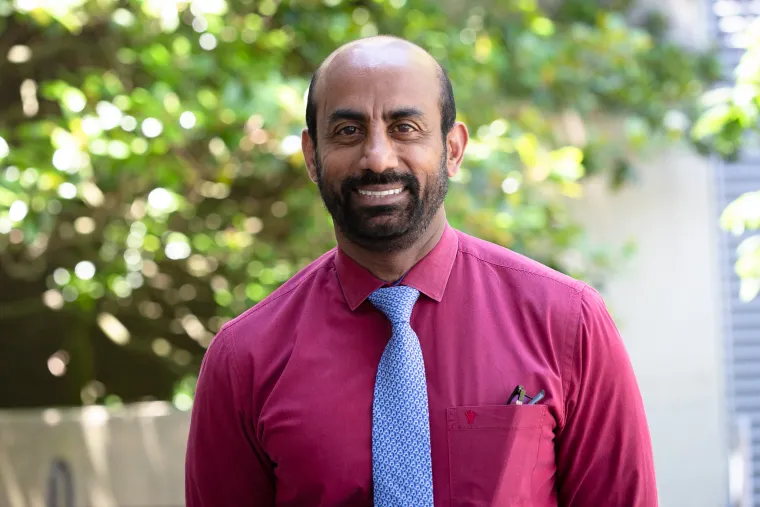College of Medicine – Tucson gains new head of Cellular and Molecular Medicine
Sakthivel Sadayappan, PhD, MBA, is the new head of the Department of Cellular and Molecular Medicine and associate director of basic science at the Sarver Heart Center.

The University of Arizona College of Medicine – Tucson appointed Sakthivel Sadayappan, PhD, MBA, as the new head of the Department of Cellular and Molecular Medicine and associate director of basic science at the Sarver Heart Center, effective Aug. 12.
He comes from the University of Cincinnati College of Medicine and brings a broad research portfolio funded by the National Institutes of Health, the American Heart Association and other sources.
“Dr. Sadayappan is a prolific and accomplished researcher focused on improving cardiac health through research that spans basic cardiac biology and genetic diseases affecting both cardiac and skeletal striated muscle,” said Michael M.I. Abecassis, MD, MBA, the Humberto and Czarina Lopez Endowed Dean of the College of Medicine – Tucson. “We’re very pleased about his arrival and the promise his work brings to the college.”
Dr. Sadayappan’s long-term research goals include discovering therapies for the treatment and prevention of conditions leading to genetically induced heart failure by better understanding the role of myosin binding protein-C regulation, which governs heart muscle contraction. On skeletal muscle genetic diseases, a topic that has expanded his portfolio more recently, he’s seeking to define the mechanisms behind distal arthrogryposis and lethal congenital contracture syndrome. These involve bent joints at birth that can’t be straightened actively or passively.
To date, his research has been published in more than 170 scientific papers, and he is pursuing three patents.
Dr. Sadayappan is keen to start, talking expansively about colleagues he already collaborated with in his new department and across the college. Those include Cellular and Molecular Medicine’s Jil Tardiff, MD, PhD, Samantha Harris, PhD, and Brett Colsen, PhD; Molecular Cardiovascular Research Program Director Henk Granzier, PhD; as well as new Sarver Heart Center Director and Division of Cardiology Chief Hesham Sadek, MD, PhD.
Dr. Sadayappan has co-authored papers with Dr. Sadek, Dr. Tardiff and Dr. Harris. He has worked with Dr. Tardiff on American Heart Association committees and considers her a valuable mentor. He also is a co-investigator on research with Dr. Colsen, with whom he’s preparing another research grant application.
“I’m very excited to expand these collaborations and bring more here as we recruit additional faculty,” Dr. Sadayappan said. “The University of Arizona and particularly this department, Cellular and Molecular Medicine, is one of the best in the world. We call it the mecca for myofilament research,” which centers on the proteins in heart muscles that help them contract. In fact, the U of A and Tucson will host the Myofilament Meeting, a major conference chaired by Dr. Granzier, in 2026.
Dr. Sadayappan, who was raised on a farm in India, comes from humble beginnings. He earned bachelor’s and master’s degrees in botany from the American College in Madurai, a city in the southern state of Tamil Nadu. His doctoral thesis at Madurai Kamaraj University was on molecular aspects of cardiac hypertrophy, a condition that leads to muscle hardening, enlarged hearts and heart failure. Afterward, he continued those studies in a postdoctoral fellowship at the Max Planck Institute for Heart and Lung Research in Germany.
At the University of Cincinnati, Dr. Sadayappan was a professor of internal medicine, the Hanna Endowed Chair of Cardiology, executive director of the Center for Cardiovascular Research, and associate director of basic research in the Division of Cardiovascular Health and Diseases. He also was associate director of the NORD Rare Disease Center of Excellence at the Cincinnati Children’s Hospital Medical Center.
Throughout his career, educating the next generation of physicians and scientists has been a priority for Dr. Sadayappan, particularly at the University of Cincinnati and Loyola University in Chicago, where he was twice honored as educator of the year. He has mentored more than 100 undergraduate, graduate and medical students, and postdocs and residents.
Dr. Sadayappan said he draws inspiration from his rural roots, which is what drives him to ensure that discoveries at the lab bench are translated into health care solutions at the clinical bedside and beyond. Those roots also drove him to establish a nonprofit, Red Saree Inc., founded in 2018, that raises health awareness among those of South Asian descent via community, research and educational opportunities.
“We’re specifically concentrating on cardiovascular health because South Asians have a four- to five-fold higher risk for developing heart disease than any other population,” he said. “During my research, I do genetic screening from this population. Often, they are not even aware they are at risk.”
This lack of awareness, he said, is largely due to different cultural perspectives about obesity and the false notion that “the bigger the belly you have, the healthier and wealthier” you are. When he goes back to India, he said, chuckling, people ask him, “What happened? Don’t they treat you well? You look thin.”
Dr. Sadayappan plans to move the headquarters of Red Saree, which now has several chapters across the country, to Tucson.

